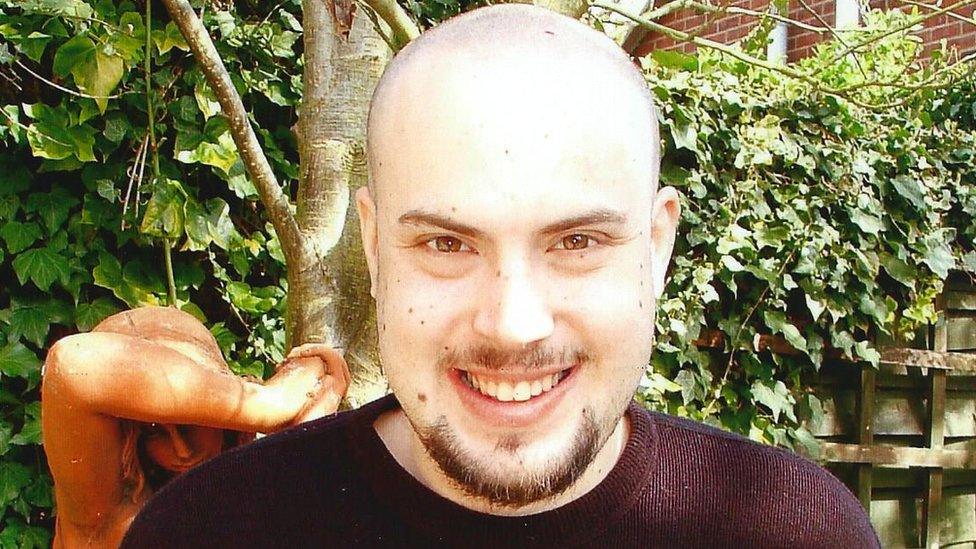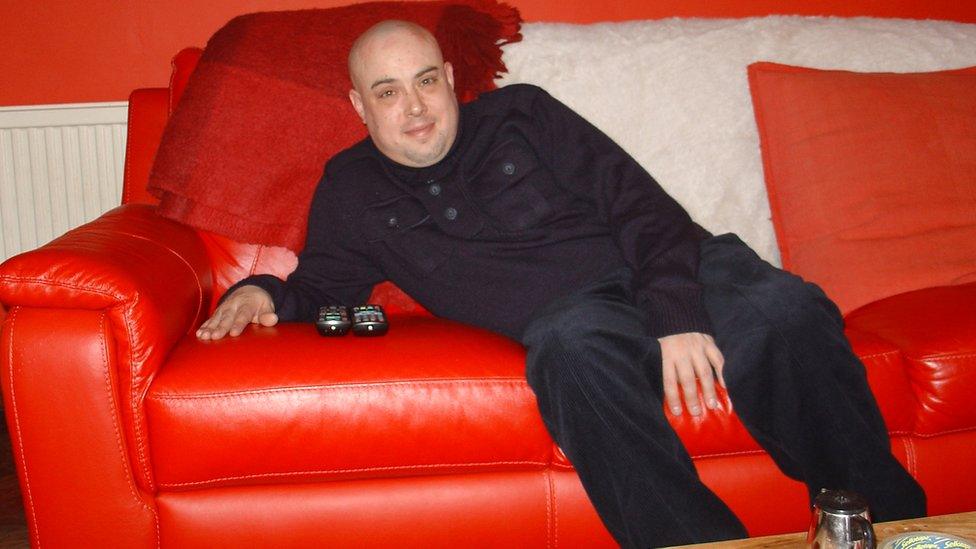Unexpected mental health deaths up 50% in three years
- Published

Leo Jacobs' death was deemed to be "unexpected"
The number of unexpected patient deaths reported by England's mental health trusts has risen by almost 50% in three years, figures suggest.
The findings, for the BBC's Panorama programme, are based on FOI results from half of mental health trusts.
Unexpected deaths include death by suicide, neglect and misadventure.
The Department of Health said the increase was "expected" because of changes to the way deaths were recorded and investigated.
Raising the issue at Commons' health questions on Tuesday, former shadow health minister Luciana Berger said she was "ashamed to live in a country" where the number of unexpected deaths among mental health patients had risen in recent years.
She said: "That is not a reflection of a country that cares equally about mental health as it does about physical health."
Health Secretary Jeremy Hunt said there was "a huge to do to improve mental health care", but said more money had been made available, and more patients were being seen. "I think we are one of the best in the world," he said.
Unexpected deaths
Thirty-three mental health trusts - which provide most mental health care - out of a total of 57 in England responded to the Panorama Freedom of Information request.
In 2012-13, the trusts reported a total of 2,067 unexpected deaths.
By 2015-16 that had risen to 3,160.
The increase comes at a time of decreased funding for mental health trusts, which provide the bulk of mental health care in England.
Exclusive new analysis for Panorama from the think tank, the Health Foundation, indicates that mental health trusts in England have had their funding cut by £150m over the past four years, compared with a rise in national spending on health of £8bn.
Mental health and stigma: 'You're not alone'
Mood self-assessment: Could I be depressed?
The death of Leo Jacobs was one of those classed as an "unexpected death".
Leo, who had schizophrenia, was 39 when he died of a suspected accidental overdose at his flat.

Leo Jacobs' mother feels he was let down
Leo's mother, Sheila Preston, said "I begged the trust to help him but they thought he was living well - he was managing but I knew that he wasn't.
"I knew that he was going to get iller and iller and iller. And he died and when they came to tell me I was not surprised. I was expecting it.
"The idea that people would be better living in the community is a very good idea - but the support is not there to help them maintain their health."
Leo was a patient at Norfolk and Suffolk Foundation Trust where Sheila is a lay governor.
"I know, I know, that my son and I know that people in the trust, good people in the trust, know that my son could've been saved."
Norfolk and Suffolk Foundation Trust has recently been removed from special measures despite concerns over high numbers of patient deaths.
It redesigned its services in 2013 after substantial cuts to its funding.
Its chief executive Michael Scott said: "Five years ago before I joined the trust, the trust was under financial pressure, there's no doubt about that, and it had to respond to that financial pressure by changing the way it ran its services.
"And my personal view is I think mistakes were made in that period."
He said of the trust "we're on a journey of improvement".
"What the facts actually show is that one of the reasons that those numbers [unexpected deaths] are changing is that we are providing more services than we ever did before.
"We've acknowledged that people are dying, what's important is that we understand the causes."
Missing out
Anita Charlesworth, economist at the Health Foundation, said mental health trusts were receiving a falling share of funding.
"The NHS has not set out to cut mental health services but as they've got rising patient demand elsewhere, they've had to look for cuts to make up that budget shortfall and often it is mental health services that have borne the brunt of those."
Almost every mental health trust in the country is currently in the process of redesigning its services and restructuring is under way across England as part of 44 STPs or Sustainability and Transformation Plans.
But there is concern about what those redesigns will mean for care.
The President of the Royal College of Psychiatrists, Sir Simon Wessely, has concerns that services may be about to get worse.
"I've been in meetings with chief executives and chairs of trusts who are openly talking about that they'll have to decommission services next year," he said.
"What is I think tragic is that it's the time when we have been promised increased funding and there is no doubt that this is not yet getting to where it is intended."
Marjorie Wallace, from the mental health charity Sane, said she was shocked by the rise in unexpected deaths.
She said: "We are particularly concerned because these are the most vulnerable people that we have entrusted into the care of mental health services and they are so often being failed - both them and their families."
A Department of Health spokesman said: "This increase in the number of deaths is to be expected because the NHS is very deliberately improving the way such events are recorded and investigated following past failings.
"From April all NHS trusts will be required to publish both numbers of avoidable deaths and how they are improving care.
"We also dispute the funding figures used in this programme - just this year, mental health spending by Clinical Commissioning Groups has gone up by £342m, which is on top of an extra £1.4bn allocated in this Parliament."
An NHS spokesperson, said: "The statistics on suicide are clear: for the last decade the suicide rate amongst people in mental health services has been falling, by more than 30% since 2004, most clearly in inpatient services and more recently in community services.
"We do not believe that the figures obtained by the BBC reflects the national data most recently published, which suggests that their figures are incomplete and misleading."
Royal Statistical Society assisted in exploring the data and evaluation of the analysis.
- Published2 February 2017
